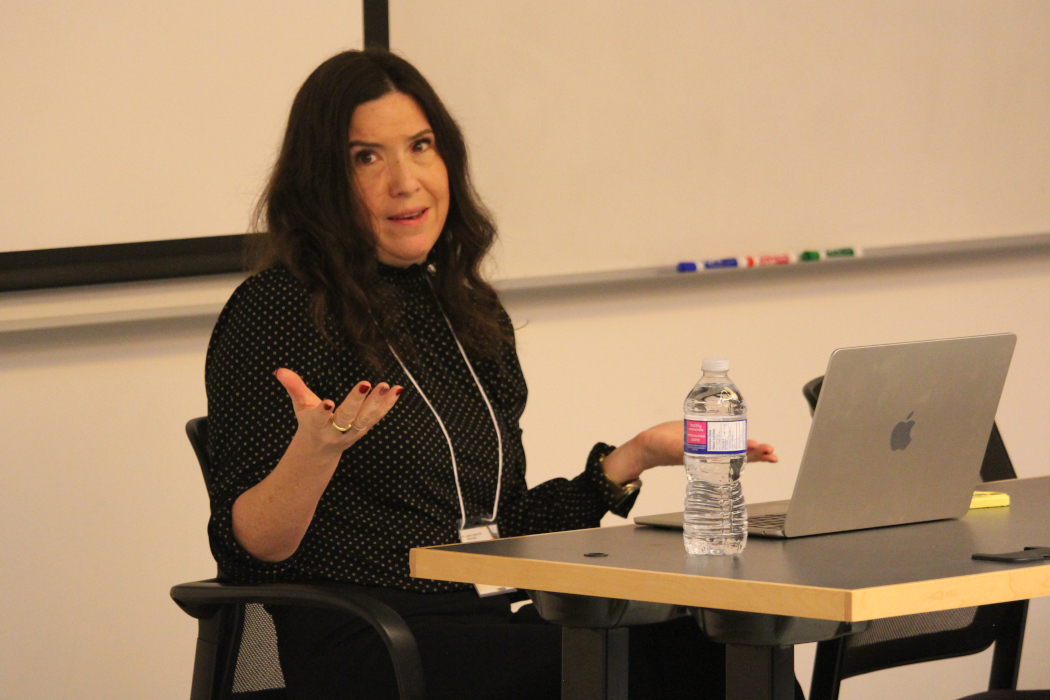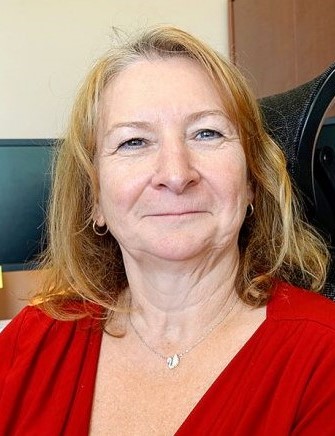
Dr. Chelsea Gabel, scientific director of Canada’s Institute of Indigenous Peoples’ Health, speaks at a symposium session.
Indigenous health researchers focus on ‘changing the narrative’
The new scientific director of Canada’s Institute of Indigenous Peoples’ Health (IIPH) says the fact that she got the job shows that the narrative of Indigenous health research is changing.
Dr. Chelsea Gabel, a Red River Métis woman, was appointed last month to lead the institute. It’s one of 13 that make up the Canadian Institutes of Health Research (CIHR), the federal funding agency for health research.
“I’m an arts-based, community-engaged scholar,” Gabel said. “I’m not your typical CIHR health researcher.”
Gabel is on a national listening tour to hear about the priorities of Indigenous health researchers. She was a keynote speaker at the 12th annual Indigenous Health Research Symposium at UM, held Nov. 13 and 14 on the Bannatyne campus.
The gathering was hosted by Ongomiizwin – Research, part of the Indigenous Institute of Health and Healing in the Rady Faculty of Health Sciences. The overall theme was “Changing the Narrative.”
Gabel holds a Canada Research Chair at McMaster University in Indigenous well-being, community engagement and innovation. She highlighted that the CIHR will soon launch a national funding program to support Indigenous health researchers as they transition into faculty positions.
Across the country, she said, Indigenous research is increasingly being conducted through an Indigenous lens, fully involving communities, using data-collection methods such as storytelling, and ensuring that communities have sovereignty over their research data.
“Unlike previous generations … we can carry out research that is developed with, by, and for First Nations, Inuit and Métis Peoples,” Gabel said.
Dr. Linda Diffey, director of Ongomiizwin – Research, also reflected on changing the narrative in research.
“By prioritizing methodologies arising from Indigenous knowledges and supporting data sovereignty, we can amplify Indigenous voices and ensure that research aligns with community-driven priorities,” Diffey said.

Dr. Vanessa Van Bewer
Dr. Vanessa Van Bewer, a Red River Métis assistant professor at the College of Nursing, gave a keynote presentation about a research project she recently led. The project focused on identifying disparities experienced by BIPOC (Black, Indigenous, People of Colour) nursing students at UM, and on challenging colonial narratives in nursing education.
Taking a decolonizing approach, the study involved BIPOC nursing students as collaborative research assistants and data analysts. Qualitative data was gathered through sharing circles.
One finding, Van Bewer said, was that the attention now being focused on Indigenous identities and curriculum content in nursing education can make Indigenous students feel singled out.
“Indigenous students experience hyper-visibility, where Indigenous topics are highlighted but not deeply engaged with, which can feel superficial and inauthentic…. This often places students in uncomfortable roles, feeling pressure to represent their culture, which adds stress and creates a sense of tokenism.”
Special supports that are intended to help Indigenous students succeed in nursing school can have an isolating and pathologizing effect, the study found.
Because Indigenous students are the only racial or ethnic group that is asked to self-identify when they apply to the University of Manitoba, they are the group that’s seen as having deficits, Van Bewer said.
“Are there problems amongst other groups of students? Well, we certainly wouldn’t know it. We don’t collect the data on that.”
The professor urged UM to expand its data collection to include all racial and ethnic groups, thoroughly analyze the data, and consider whether the targeted supports offered to Indigenous students should be broadened into more inclusive supports.

Dr. Marti Ford
The final keynote speaker at the symposium, Dr. Marti Ford, is associate dean, Indigenous education in the UM Faculty of Education. She is of mixed Inuit and settler heritage.
Ford spoke about collaborating with Brandon University researchers to deliver and evaluate a land-based cultural program for Indigenous men.
The men took part in ceremonies and acquired traditional knowledge through activities such as moose hunting, drum making and sweat lodge building. They used the participatory “photovoice” method to document these experiences.
The study found that the program fostered close relationships and a sense of purpose among the men, awakened their Indigenous pride and had strong healing effects on their mental health.
“There’s a growing body of research on the importance of cultural connection, teaching and ceremony, particularly in relation to Indigenous health and well-being,” Ford said.






